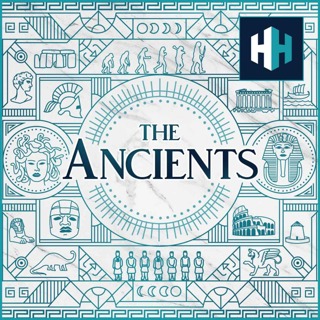
Antonine Wall
In c.142 AD the Emperor Antoninus Pius ordered the construction of a new wall in Northern Britain. Situated between the Firth of Forth and the Firth of Clyde it stretched the neck of modern day central Scotland and was called the Antonine Wall. Although its ‘lifespan’ was relatively short-lived, this wall beyond ‘The Wall’ boasts a remarkable history. Archaeological discoveries continue to reveal more about this monumental structure and its accompanying features. From the terrible ‘lillia’ spike pits the Romans placed in front of the rampart to the Wall’s strong stone foundations.I was delighted to be joined by Andrew Tibbs to learn more about the Antonine Wall and why we must NOT call it the northernmost physical barrier of the Roman Empire. Andrew is the author of 'Beyond the Empire: A Guide to the Roman Remains in Scotland'. Hosted on Acast. See acast.com/privacy for more information.
12 Juli 202047min

Housesteads and Hadrian's Wall
Housesteads Roman Fort is one of the great, surviving treasures of Roman Britain. Once an auxiliary fort, it occupied a dominant position on Hadrian’s Wall. The Fort has proven vital in helping archaeologists and historians achieve a greater understanding about life on Hadrian’s Wall. From the worship of peculiar deities to everyday sanitation.To chat through Housesteads’ extraordinary archaeology and what it can tell us about life along this frontier, I’m joined by Professor Jim Crow from the University of Edinburgh. Jim has conducted excavations at several locations along Hadrian’s Wall, including Housesteads. He also lectured me a few years back, so it was great to catch up. Hosted on Acast. See acast.com/privacy for more information.
5 Juli 202046min

Origins of Biological & Chemical Warfare
The origins of biological and chemical warfare stretch far back; modern technology has not brought about these terrifying weapons. Throughout antiquity we have cases of societies using poisonous gases, incendiary materials and living organisms against their enemies. From snake and scorpion bombs to the use of ancient naphtha grenades. But how did the ancients view these infamous weapons? Did they try to refrain from using them? And if they did use them, why?I was thrilled to be joined by Adrienne Mayor to chat through this extraordinary topic. Adrienne is a folklorist and historian of ancient science at Stanford University. She is the author of numerous books including Greek Fire, Poison Arrows and Scorpion Bombs: Biological and Chemical Warfare in the Ancient World. Hosted on Acast. See acast.com/privacy for more information.
2 Juli 202030min

Fall of the Western Roman Empire
In the late 4th century and early 5th centuries two massive largely-Germanic confederations arrived on Roman borders, having been uprooted from their homelands by the Huns. These were the Goths and the Vandals. Both peoples would become prime enemies of the Roman Empires in the East and West. Both would sack Rome; both played significant roles in the decline of the Western Roman Empire, inflicting terrible defeats and seizing some of the most lucrative territory in the Western Mediterranean. To talk through this ‘barbarian’ impact on the Fall of the Western Roman Empire, I’m chatting with Peter Heather, Professor of Medieval History at King’s College London and the author of ‘The Fall of the Roman Empire: A New History of Rome and the Barbarians’. Hosted on Acast. See acast.com/privacy for more information.
26 Juni 20201h 2min

Plague of Athens
Plague in the ancient world was nothing unusual. Bouts of illness were common occurrences, but we do have accounts of some exceptional outbreaks: epidemics that brought powerful empires and city-states to their knees. One of the most infamous occurred in 430 BC: the Plague of Athens. Recently I was fortunate enough to interview Alastair Blanshard, a Professor of Classics and Ancient History at the University of Queensland, about this devastating episode in Athenian history. Hosted on Acast. See acast.com/privacy for more information.
24 Juni 202035min





















